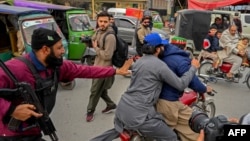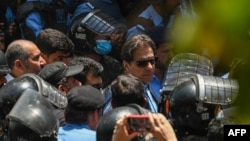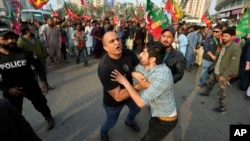The United Nations human rights agency voiced concern Tuesday over Pakistan's crackdown on the opposition party of former Prime Minister Imran Khan ahead of this week's parliamentary election.
Elizabeth Throssell, spokesperson for the U.N. high commissioner for human rights, urged Pakistani authorities to ensure the right to participation of all people for an inclusive democratic process.
"All eligible parties must be able to compete fairly," she said during a news briefing in Geneva.
"We are disturbed, therefore, by the pattern of harassment, arrests and prolonged detentions of leaders of the Pakistan Tehreek-e-Insaf party and their supporters, which has continued during the election period," Throssell said.
In the months leading to Thursday's vote, PTI has been subjected to a nationwide state clampdown, with hundreds of workers and candidates arrested without charges and released only after quitting the party or withdrawing from the election.
Party officials and local media reported Tuesday that police continued raiding election offices and residences of PTI leaders and workers across Pakistan on the eve of the elections.
Khan, 71, has been in prison since last August after a court found him guilty of graft and sentenced him to three years.
Last week, he was convicted on several highly controversial charges of corruption, leaking state secrets and violating a marriage law. He received prison terms of up to 14 years and was disqualified from holding public office.
Khan and his lawyers rejected the charges and complained that the trials were politically motivated and concluded hastily to demoralize PTI supporters. His legal team has appealed the convictions in higher courts.
The cricket hero-turned-prime minister was removed from office through an opposition parliamentary vote of no confidence in April 2022.
Khan accuses the military of orchestrating his ouster and maintains the powerful security institution is behind dozens of pending lawsuits against him as punishment for questioning generals' illegal intervention in politics. There has been no response from the military.
"We expect the higher courts will carefully review these conclusions in line with applicable due process and fair trial rights and Pakistan's wider international human rights obligations," Throssell said.
She also deplored violent acts targeting political parties and candidates ahead of the vote, in which several people were killed and dozens more were wounded.
With Khan out of the election race, his bitter rival, Nawaz Sharif, a three-time former prime minister, seems to be the top contender for the country's chief executive post.
Sharif ended his years of self-imposed exile and returned to Pakistan in October after allegedly striking a deal with the military and has since been absolved of past convictions for corruption. He and the military have been mostly silent on the deal allegations.
On Tuesday, state media quoted caretaker Prime Minister Anwaar-ul-Haq Kakar as telling a delegation of foreign election observers that his government had made "the best possible arrangements" to ensure a "peaceful and seamless conduct of elections on polling day across the country."
Federal Interior Minister Gohar Ejaz told reporters in Islamabad that, citing security concerns, the government may temporarily disrupt internet service in parts of the country during Thursday's election if provincial or district authorities request it.
"As of now, no decision has been made. If a request is received from a province or a district, we will assess the threat level in that area," Ejaz told reporters in Islamabad. "Terrorists use WhatsApp for internal communication. If there is terrorist activity, should we not stop communication?" he asked.
The minister's remarks prompted human rights defenders to urge Islamabad not to suspend internet service, warning that doing so would damage the credibility of an electoral process already under fire.
"Pakistan authorities must immediately reverse repressive measures aimed at curtailing journalists' ability to report freely in the lead-up to the February 8 polls," Beh Lih Yi, Asia program coordinator at the U.S.-based Committee to Protect Journalists, said Tuesday in a statement.
She added, "Blocking critical reporting and hindering access to an open flow of information will only raise more questions about the election, which is already under scrutiny for its legitimacy."
Amnesty International pressed Pakistan to "guarantee interrupted access to the internet and digital communication platforms for everyone across the country."
In the run-up to the vote, authorities have repeatedly suspended internet service and blocked access to major social media platforms nationwide to disrupt PTI virtual assemblies and campaigning.
The party's official website has been blocked in Pakistan for nearly two weeks, denying voters access to information. Government officials and the state-run Pakistan Telecommunication Authority remain silent on the matter.
Throssell also noted in her statement Tuesday that the parliamentary election "is a reminder of the barriers faced by women and minority communities in Pakistan, particularly the Ahmadis."
The Muslim-majority nation of about 241 million people declared Ahmadis non-Muslims in 1974. Human rights groups say the legislation encouraged Islamic extremists to attack members of the minority community, their worship places and even graveyards in the years that followed.
"Separate voter lists — as is the case for the Ahmadis — expose them to harassment and violence, despite the equal rights guaranteed to minorities in Pakistan's constitution," she said.
The OHCHR spokesperson also raised concerns regarding the fact that even though 22% of seats in the National Assembly or lower house of parliament are reserved for women, some political parties seem to have failed to meet the legal requirement of having at least 5% women candidates on their party lists.






